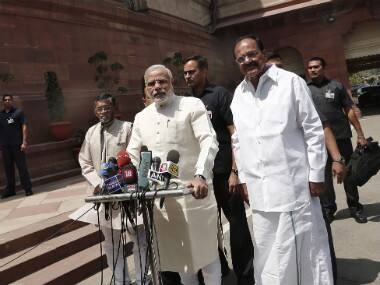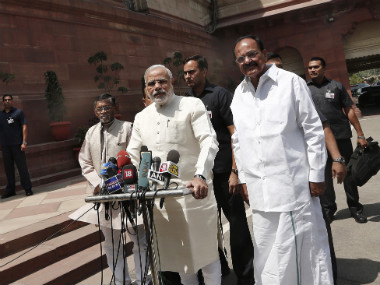Here is a bit of breaking news which will soon be officially announced. Prime Minister Narendra Modi will be embarking on his Brazil trip either on 11 July evening or 12 July morning to watch the World Cup Final in Rio on 13 July in the company of BRICS leaders like President of China (Xi Jinping), Russia (Vladimir Putin), South Africa (Jacob Zuma) but also of United States President Barack Obama, German Chancellor Angela Merkel and many more. In the normal circumstances, the prime ministerial foreign visit is announced a week before. But then these are not ‘normal’ circumstances when Iraq is on the boil, especially when 39 Indian construction workers are being held hostage in that country for a week. The next one week or so should be crucial for the PMO to finalise the Prime Minister’s itinerary. Therefore, one would have to take into account how the Iraq hostage crisis pans out and only then the PM’s Brazil tour will be announced. Needless to say, if anything untoward were to happen on the hostage crisis front it would have a telling impact on the PM’s Brazil itinerary. As of now, as Firstpost broke the story on 17 June, the PM is likely to embark on his Brazil trip after parliament’s budget session is convened (7 July-14 August) and Modi is free after the main parliamentary agenda is set into motion – Rail Budget on 8 July, Economic Survey on 9 July and the General Budget on 10 July. As mentioned earlier, this is the tentative schedule of PM Modi’s Brazil trip. This schedule is heavily predicated on a crucial X factor – the fate of the 39 Indians being held hostage in Iraq by suspected Islamic State of Iraq and Syria (ISIS) militants. Modi’s itinerary can change drastically depending on any adverse outcome of the hostages in Iraq. [caption id=“attachment_1586137” align=“alignleft” width=“380”] PM Narendra Modi in this file photo. Reuters[/caption] The Ministry of External Affairs has refused to give any guarantees about the safety and well-being of the 39 hostages with MEA spokesperson Syed Akbaruddin having gone as record with his chilling one-line remark: “There cannot be any safety in captivity”. The reasons for Modi’s Brazil trip being in a state of flux are not difficult to comprehend. The Iraqi situation is like a melting pot where anything can happen anytime. The fast-paced developments in Iraq have left everyone confounded. On Monday, it became apparent that the Iraqi government lost control of its borders with Syria and Jordan to the Islamic State of Iraq and Syria (ISIS) and Iraq’s entire Western frontier is now outside government control. Though it is a very serious development, indicative of the growing might of the ISIS and the fast-increasing erosion in the writ of the Iraqi government, it still does not alter the security and strategic calculus as far as the 39 Indian hostages are concerned. There are three reasons for this optimism. First, the Indian hostages are being held deep inside Iraq, far from the borders where the Sunni extremists have consolidated their marauding run. In any case, they had come from the Syrian border and falling of a few more border checkposts with Syria as well as Jordan does not significantly change the scenario for the Indian hostages. Two, Iraq is a predominantly Shia nation with over 60 percent of its 32.5 million people being Shias, the unfolding Iraqi turbulence is expected to reach its peak with only Sunni-dominated regions. The Sunni extremists in Iraq are not expected to run over rival influence zones of Shias and Kurds, the latter also in sizable numbers (20 percent of the total population). Therefore, even in the worst case scenario, the marauding Sunni extremists are likely to enlarge their footprints but not gobble up territories where Shias and Kurds are in dominance. The situation is likely to reach a plateau point sooner or later. Three, the MEA is sounding more upbeat about its work so far in Iraq since the hostage crisis hit India. Sample this quote of MEA spokesperson Syed Akbaruddin in his briefing on 23 June: “On the diplomatic front, our efforts are continuing both in Iraq and outside. Our initiatives are gaining impetus. We are proceeding systematically and carefully. Various doors are opening now; these are primarily in Iraq at various levels, all of which are significant. Our information flow has improved providing us channels to obtain, corroborate and confirm information … We remain engaged with a variety of companies – 12 by my record, largely in the southern part of Iraq but some of them also in the northern part which is with a Kurdish government there. There is a northern part of Iraq where, by all accounts, there is no safety issue there.” The writer is a Firstpost columnist and a strategic analyst who tweets @Kishkindha.
PM Narendra Modi in this file photo. Reuters[/caption] The Ministry of External Affairs has refused to give any guarantees about the safety and well-being of the 39 hostages with MEA spokesperson Syed Akbaruddin having gone as record with his chilling one-line remark: “There cannot be any safety in captivity”. The reasons for Modi’s Brazil trip being in a state of flux are not difficult to comprehend. The Iraqi situation is like a melting pot where anything can happen anytime. The fast-paced developments in Iraq have left everyone confounded. On Monday, it became apparent that the Iraqi government lost control of its borders with Syria and Jordan to the Islamic State of Iraq and Syria (ISIS) and Iraq’s entire Western frontier is now outside government control. Though it is a very serious development, indicative of the growing might of the ISIS and the fast-increasing erosion in the writ of the Iraqi government, it still does not alter the security and strategic calculus as far as the 39 Indian hostages are concerned. There are three reasons for this optimism. First, the Indian hostages are being held deep inside Iraq, far from the borders where the Sunni extremists have consolidated their marauding run. In any case, they had come from the Syrian border and falling of a few more border checkposts with Syria as well as Jordan does not significantly change the scenario for the Indian hostages. Two, Iraq is a predominantly Shia nation with over 60 percent of its 32.5 million people being Shias, the unfolding Iraqi turbulence is expected to reach its peak with only Sunni-dominated regions. The Sunni extremists in Iraq are not expected to run over rival influence zones of Shias and Kurds, the latter also in sizable numbers (20 percent of the total population). Therefore, even in the worst case scenario, the marauding Sunni extremists are likely to enlarge their footprints but not gobble up territories where Shias and Kurds are in dominance. The situation is likely to reach a plateau point sooner or later. Three, the MEA is sounding more upbeat about its work so far in Iraq since the hostage crisis hit India. Sample this quote of MEA spokesperson Syed Akbaruddin in his briefing on 23 June: “On the diplomatic front, our efforts are continuing both in Iraq and outside. Our initiatives are gaining impetus. We are proceeding systematically and carefully. Various doors are opening now; these are primarily in Iraq at various levels, all of which are significant. Our information flow has improved providing us channels to obtain, corroborate and confirm information … We remain engaged with a variety of companies – 12 by my record, largely in the southern part of Iraq but some of them also in the northern part which is with a Kurdish government there. There is a northern part of Iraq where, by all accounts, there is no safety issue there.” The writer is a Firstpost columnist and a strategic analyst who tweets @Kishkindha.
Consulting Editor, First Post. Strategic analyst. Political commentator. Twitter handle @Kishkindha.
)